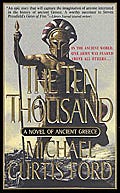In The Ten Thousand Michael Curtis Ford has ably retold the story of one of the most famous adventures of the period after the catastrophic Peloponnesian War ended in 404 B.C. There Xenophon, a young man from Socrates’ circle who had made an unhappy choice of sides after the Spartan victory, headed east into the Persian Empire to seek fame and fortune as a mercenary. Fortune was not kind, but he won fame for his response in a time of crisis. His own written account of his amazing adventures in Asia was called the Anabasis, to which my paperback translation adds: The March Up Country.
Whatever the title, it’s one of the great military adventures of all time, and with The Ten Thousand Ford does a good job of conveying it in novel form. His narrator is Xenophon’s life-long servant and companion, who begins the story with a terrifying scene of battle under dire conditions. Defeated, Xenophon decides to try his luck abroad, but the story first takes a long flashback to his youth, including his first meeting with Socrates. Eventually Xenophon and his servant are mustering with other Greek soldiers, part of a core unit of ten thousand hoplites marching on and on across Asia Minor with no clear notion of where they are heading. It should surprise no one to learn there are indeed battles, betrayal looms more than once, and the climax of the story involves a keen struggle for survival. The fact that Xenophon survived to write his own account is an obvious clue to the outcome, so it’s no spoiler to note that this was one more episode confirming the truth of the Persian warning that Greeks standing together in battle order were very hard to beat. So too is Ford’s telling of the tale. (2001, 384 pages)



